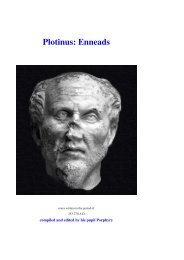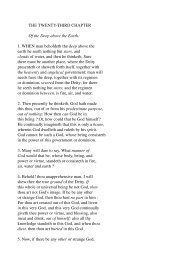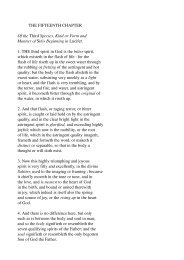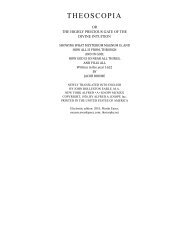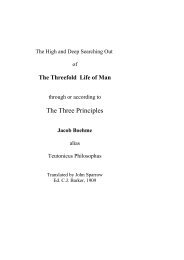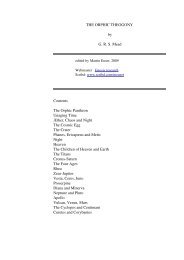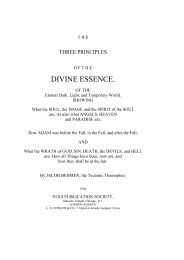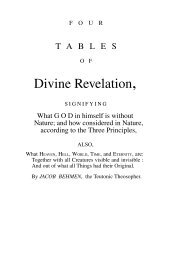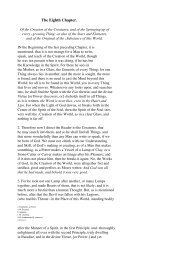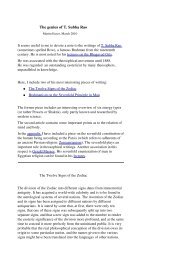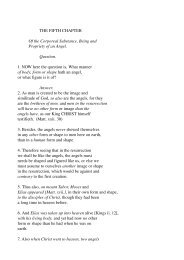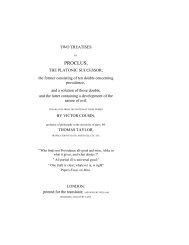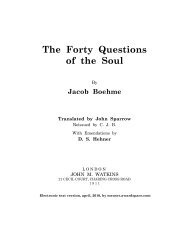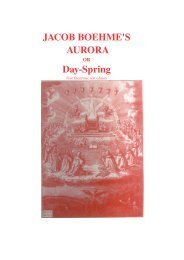Gerald Massey's Lectures - Society in evolution - Awardspace
Gerald Massey's Lectures - Society in evolution - Awardspace
Gerald Massey's Lectures - Society in evolution - Awardspace
You also want an ePaper? Increase the reach of your titles
YUMPU automatically turns print PDFs into web optimized ePapers that Google loves.
that God is only the orig<strong>in</strong>ator of good, never of evil. They show their love of virtue by<br />
their <strong>in</strong>difference to ga<strong>in</strong>, glory, and pleasure; by their temperance, perseverance,<br />
simplicity, absence of wants, humility, faithfulness, and straightforwardness. They<br />
exemplify their love for their fellow-creatures by k<strong>in</strong>dness, absence of pretensions, and<br />
lastly by the community of goods." There you have what is termed an Ideal Christian<br />
Community! but this was a Reality, and it was not founded by any personal Jesus; nor<br />
was it a result of his personal teach<strong>in</strong>gs be<strong>in</strong>g reduced to practice. It preceded, and was<br />
not a birth of, Historic Christianity.<br />
Philo tells us that those who retired from the turmoil of public life to dwell apart <strong>in</strong><br />
solitary places (these be<strong>in</strong>g the precursors of the monks and nuns <strong>in</strong> the Roman Church)<br />
handed over their private property to others, and left their parents, brothers and sisters,<br />
wife and child, and gave up all to the mysteries of a dedicated life. This, which was a<br />
common reality with the Essenes, is set forth as an Ideal when the Canonical Teacher<br />
says--"If any man cometh unto me, and hateth not his own father and mother and wife<br />
and children and brethren and sisters, yea, and his own life also, he cannot be my<br />
disciple." Here the ideal is perhaps a trifle overdone. The Essenes did not express or<br />
<strong>in</strong>culcate any such spirit of hatred to all one's relations. They were no such rabid ant<strong>in</strong>aturalists<br />
as that! The peaceful Essenic spirit is not present, but rather the spirit of<br />
Christian persecution that lighted the fires of martyrdom.<br />
Of those Essenes who moved about <strong>in</strong> the world Josephus tells us (he also was an Essene<br />
<strong>in</strong> early life who did not f<strong>in</strong>d Jesus), "They have no one certa<strong>in</strong> city, but many of them<br />
dwell <strong>in</strong> every city; and if any of them come from other places, what they have lies open<br />
for the strangers, just as if it were their own--for which reason they carry noth<strong>in</strong>g at all<br />
with them on their travels; nor do they buy or sell anyth<strong>in</strong>g one to another, but every one<br />
of those who have gives to him that requires it."<br />
The Essenes were phenomenal Spiritualists, <strong>in</strong> the current sense, who walked with open<br />
sight, and could never become the bl<strong>in</strong>d followers of the shut-eyed faith of the<br />
Historicisers, who banned the "malignant spirit of free <strong>in</strong>quiry." As Spiritualists they<br />
could not, and did not, believe <strong>in</strong> the resurrection of the body, consequently a corporeal<br />
resurrection of the Christ was a fundamental fallacy upon which no Essene or Gnostic<br />
could found at any time. So Anti-Christian were they <strong>in</strong> the Catholic sense, and so<br />
opposed to the Messiah of pubescence, the Christ accord<strong>in</strong>g to the flesh, that they<br />
repudiated ano<strong>in</strong>t<strong>in</strong>g with oil, and considered it to be a filthy defilement. Therefore their<br />
Christ did not depend upon any external ano<strong>in</strong>t<strong>in</strong>g <strong>in</strong> baptism at the age of thirty years,<br />
and they never could become Christians as the ano<strong>in</strong>ted ones. They were the opponents<br />
of all blood-sacrifice, animal or human. The only sacrifice upheld by them was that of the<br />
self. Therefore they did not accept the bloody sacrifice of the <strong>in</strong>carnate Son of God when<br />
it was proclaimed. The Essenes as Gnostics held that every man must be his own Christ.<br />
Their Christ came with<strong>in</strong>--the Christ that could not become historical without. In the<br />
m<strong>in</strong>ds of those who knew, Historic Christianity was repudiated beforehand; and it was as<br />
impossible after the facts were forged, the falsehood established, and the dogma was<br />
founded, as it was before; consequently those Gnostics who had been Ante-Christians<br />
beforehand were of necessity Anti-Christians afterwards.<br />
The Essenes discarded the Pentateuch and repudiated most of the later prophets--that is,<br />
they rejected the ground-work of the future redemption of mank<strong>in</strong>d, together with the Fall<br />
that never was a fact, and the fulfilment of prophecy which never could be human. The<br />
Essenes and other Gnostics are constantly charged by the ignorant Christians with turn<strong>in</strong>g<br />
very pla<strong>in</strong> matters of fact <strong>in</strong>to fantastical parables. M. Renan talks of Simon's and Philo's<br />
allegoris<strong>in</strong>g exegesis as if the ancient fables had been historic facts which the Gnostics<br />
perverted <strong>in</strong>to myths. They were noth<strong>in</strong>g of the k<strong>in</strong>d. They were fables and allegories<br />
from the first--the mysteries that were taught <strong>in</strong> parables--and all Gnostics rejected the<br />
historic explanation from beg<strong>in</strong>n<strong>in</strong>g to end, because they preserved the true <strong>in</strong>terpretation



